|
|
|
Sort Order |
|
|
|
Items / Page
|
|
|
|
|
|
|
| Srl | Item |
| 1 |
ID:
132417
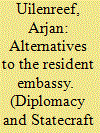

|
|
|
|
|
| Publication |
2014.
|
| Summary/Abstract |
Increasingly integrated in a common political entity, the European Union's member states are exploring new avenues to shape and maintain their mutual relations. This analysis describes three alternatives to the traditional resident embassy by which ministries of foreign affairs within the EU attempt to maintain diplomatic networks. The models discussed are secondments within member states' capitals, visiting ambassadors, and co-location and co-operation. In other words, with regard to different modes of representation, member states can consider diving in, stepping back, or pooling and sharing. These developments shed light on the ways in which the diplomatic machineries of the member states are trying to adapt to the demands of a "post-Westphalian" environment such as that of the EU.
|
|
|
|
|
|
|
|
|
|
|
|
|
|
|
|
| 2 |
ID:
131492
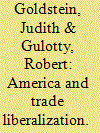

|
|
|
|
|
| Publication |
2014.
|
| Summary/Abstract |
Among scholars, delegation of power to the US president in 1934 is widely believed to have been a necessary requisite for tariff reductions in ensuing years. According to conventional wisdom, delegation to the president sheltered Congress from constituent pressure thereby facilitating the opening of the US economy and the emergence of the United States as a world power. This article suggests a revision to our understanding of just how that occurred. Through a close study of the US tariff schedule between 1928 and 1964, focusing on highly protected products, we examine which products were subject to liberalization and at what time. After 1934, delegation led to a change in trade policy, not because Congress gave up their constitutional prerogative in this domain but because presidents were able to target the potential economic dislocation that derives from import competition to avoid the creation of a congressional majority willing to halt the trade agreements program.
|
|
|
|
|
|
|
|
|
|
|
|
|
|
|
|
| 3 |
ID:
126581
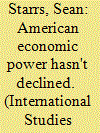

|
|
|
|
|
| Publication |
2013.
|
| Summary/Abstract |
This paper argues that a fundamental failing in the debate on the decline of American economic power is not taking globalization seriously. With the rise of transnational corporations (TNCs), transnational modular production networks, and the globalization of corporate ownership, we can no longer give the same relevance to national accounts such as balance of trade and GDP in the twenty-first century as we did in the mid-twentieth. Rather, we must summon data on the TNCs themselves to encompass their transnational operations. This will reveal, for example, that despite the declining global share of United States GDP from 40% in 1960 to below a quarter from 2008 onward, American corporations continue to dominate sector after sector. In fact, in certain advanced sectors such as aerospace and software-even in financial services-American dominance has increased since 2008. There are no serious contenders, including China. By looking at the wrong data, many have failed to see that American economic power has not declined-it has globalized.
|
|
|
|
|
|
|
|
|
|
|
|
|
|
|
|
| 4 |
ID:
122832
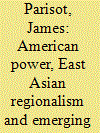

|
|
|
|
|
| Publication |
2013.
|
| Summary/Abstract |
Recent years have seen a revival of discussions on American decline. This paper intervenes in this debate by suggesting that there is a tendency towards partial conceptualisations of US power. It suggests a new historical materialist perspective that makes it possible to theorise American Empire as a relational social totality embedded within global capitalism. The paper then analyses the social limits of China's rise and the integration of East Asian regionalisation into American Empire, suggesting the extent to which world power has shifted east has tended to be overestimated. It also analyses the emergence of Brazil, India, and the brics meetings, suggesting these developments have a limited, but overstated, capacity to challenge American Empire.
|
|
|
|
|
|
|
|
|
|
|
|
|
|
|
|
| 5 |
ID:
095540
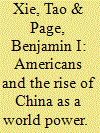

|
|
|
|
|
| Publication |
2010.
|
| Summary/Abstract |
The rapid ascendency of China has attracted considerable attention from American scholars, policymakers, and media. Yet what does the American public think about the rise of China as a world power? In this paper we use survey data collected by the Chicago Council on Global Affairs and other organizations to explore the nature and causes of Americans' views. It turns out that most Americans are well aware of the rise of China. Some are apprehensive about that rise, chiefly for national security (rather than economic) reasons, and many favor a degree of off-shore 'balancing' of the sort that realists recommend. But few Americans want to actively work to limit the rise of China. Very few favor the use of troops to defend Taiwan. Very few favor a nuclear-armed Japan. Large majorities of Americans take stands more akin to those of neo-liberals than realist theorists, favoring cooperation and peaceful engagement with China.
|
|
|
|
|
|
|
|
|
|
|
|
|
|
|
|
| 6 |
ID:
108882
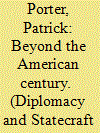

|
|
|
|
|
| Publication |
2011.
|
| Summary/Abstract |
As the United States became a world Power, journalist and intellectual Walter Lippmann feared that it would become its own worst enemy. During and after the Second World War, he tried to steer the country towards coherent statecraft, to define the national interest and the limits of power, and give geopolitical expression to the role of the United States as the core of an Atlantic strategic system. But in response to world war, the Truman Doctrine, and the Korean War, he became pessimistic about the country's ability to conduct strategy effectively. In the prophetic tradition, he believed that a fatal symbiosis between America's growing strength and domestic politics led it towards crisis. Though at times ahistorical, Lippmann's concept of strategy deserves attention for its dialogue between power and identity, for its questioning of "ends" as well as means, and for its focus on the danger of self-defeating behaviour.
|
|
|
|
|
|
|
|
|
|
|
|
|
|
|
|
| 7 |
ID:
129104
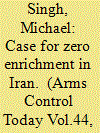

|
|
|
|
|
| Publication |
2014.
|
| Summary/Abstract |
In the debate over sanctions on Iran-their role in bringing Tehran to the negotiating table and their proper place in U.S. diplomatic strategy in the future-scant attention has been paid to a major shift in the negotiating position of the P5+1, the group of six countries (China, France, Germany, Russia, the United Kingdom, and the United States) that is negotiating with Tehran over the Iranian nuclear program. No longer is the P5+1 demanding that Iran halt uranium enrichment. Indeed, in the November 24 first-step nuclear accord, the Joint Plan of Action,[1] the P5+1 all but concedes that Iran will be permitted to enrich in perpetuity. In separate comments that have quickly become conventional wisdom among Iran analysts, U.S. negotiators now characterize their previous position that Iran should halt enrichment as "maximalist."[2] Although undoubtedly expedient, this shift away from a zero-enrichment negotiating position is misguided and unnecessary.[3] The U.S. shift away from zero enrichment to limited enrichment represents a significant diplomatic victory for Iran. For the last decade, the position of the EU-3 (France, Germany, and the UK) and then the P5+1 had been that Iran must "suspend all enrichment-related and reprocessing activities, including research and development." This position was enshrined as an Iranian obligation in a series of UN Security Council resolutions.[4] Iran, however, asserted a "right to enrich" and refused to halt enrichment after resuming it when nuclear talks with the European Union broke down in 2005. This difference formed the core of the confrontation that subsequently developed between Iran and the allies.
|
|
|
|
|
|
|
|
|
|
|
|
|
|
|
|
| 8 |
ID:
132554
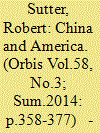

|
|
|
|
|
| Publication |
2014.
|
| Summary/Abstract |
While there have been many sources of tension in U.S.-China relations since the Cold War, they have been held in check generally by circumstances that have inclined the governments to cooperate. Yet, the relationship remains multi-faceted and fragile, and various frameworks and forecasts-like the contemporary "Great Divergence" framework, which speaks to the apparent disjunction between economic and security affairs-have proven to be incomplete and incorrect.
|
|
|
|
|
|
|
|
|
|
|
|
|
|
|
|
| 9 |
ID:
054086
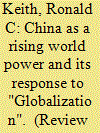

|
|
|
| 10 |
ID:
131338
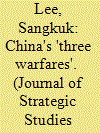

|
|
|
|
|
| Publication |
2014.
|
| Summary/Abstract |
Entering the twenty-first century, China has demonstrated an assertive foreign policy, not only in employing various types of economic and military leverage but also in conducting the Three Warfares (??) - psychological warfare, public opinion warfare, and legal warfare. This article attempts to identify the motives and methods of China's Three Warfares by analyzing its history, logic, and agents. Based on this analysis, the author also presents the position of the Three Warfares in China's foreign policy and the warfares' impact on the international security environment involving other major powers and China's neighbors.
|
|
|
|
|
|
|
|
|
|
|
|
|
|
|
|
| 11 |
ID:
129103
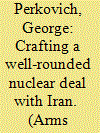

|
|
|
|
|
| Publication |
2014.
|
| Summary/Abstract |
A final nuclear deal with Iran should meet the underlying objective of the relevant UN Security Council resolutions since 2006: "the establishment of international confidence in the exclusively peaceful nature of Iran's nuclear programme."A final agreement could be codified and endorsed through a new resolution, which need not include all of the specific instrumental elements of past resolutions-for example, suspension of all uranium enrichment-if the council determines that the overall objective has been met. As the resolutions acknowledge, to be durable, such an agreement also must satisfy Iran's interest in having a purely peaceful nuclear program free from sanctions. The devilish challenge will be in the details. History will inform each party's requirements. The six-country group that has been negotiating with Iran, the so-called P5+1 (China, France, Germany, Russia, the United Kingdom, and the United States), will remember that Iran secretly had, at least until 2003, what appeared to be a dedicated, multifaceted program to acquire capabilities to produce nuclear weapons. Iran still has not cooperated fully with the International Atomic Energy Agency (IAEA) to clarify these activities and continues to expand sensitive fuel-cycle capabilities beyond any plausible civilian requirement. Iranian leaders, for their part, remember numerous episodes that reflect a U.S. determination to hasten an end to their regime.
|
|
|
|
|
|
|
|
|
|
|
|
|
|
|
|
| 12 |
ID:
165170
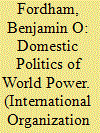

|
|
|
|
|
| Summary/Abstract |
The United States' 1890–91 decision to begin building a battleship fleet, an important point in its development as a world power, can illuminate the domestic sources of foreign policy ambition. An analysis of roll-call votes in the House of Representatives indicates that socioeconomic divisions arising from industrialization strongly influenced support and opposition to the battleship fleet. This relationship worked mainly through trade policy interests: members of Congress from import-competing states tended to support the effort, while those from export-oriented states tended to oppose it. The patriotic symbolism of battleships at a time of labor unrest also helped motivate support for the program, though evidence of this pattern is less conclusive. Although party affiliation was crucial, it was also partly a function of economic structure, which shaped the two parties’ electoral fortunes. The impact of trade interests during this period is a mirror image of what previous research has found concerning the post-World War II era, when export-oriented interests tended to support American global activism and import-competing interests to oppose it. The reason for the difference is the Republican Party's commitment to trade protection, which strongly influenced both the goals of the policy and the identity of its supporters.
|
|
|
|
|
|
|
|
|
|
|
|
|
|
|
|
| 13 |
ID:
110685
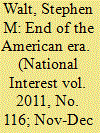

|
|
|
|
|
| Publication |
2011.
|
| Summary/Abstract |
THE UNITED States has been the dominant world power since 1945, and U.S. leaders have long sought to preserve that privileged position. They understood, as did most Americans, that primacy brought important benefits. It made other states less likely to threaten America or its vital interests directly. By dampening great-power competition and giving Washington the capacity to shape regional balances of power, primacy contributed to a more tranquil international environment. That tranquility fostered global prosperity; investors and traders operate with greater confidence when there is less danger of war. Primacy also gave the United States the ability to work for positive ends: promoting human rights and slowing the spread of weapons of mass destruction. It may be lonely at the top, but Americans have found the view compelling.
|
|
|
|
|
|
|
|
|
|
|
|
|
|
|
|
| 14 |
ID:
051754
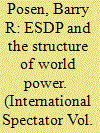

|
|
|
|
|
| Publication |
Jan-Mar 2004.
|
|
|
|
|
|
|
|
|
|
|
|
|
|
|
|
| 15 |
ID:
098297
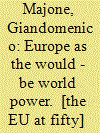

|
|
|
|
|
| Publication |
Cambridge, Cambridge University Press, 2009.
|
| Description |
vi, 259p.
|
| Standard Number |
978052176528, hbk
|
|
|
|
|
|
|
|
|
|
|
|
Copies: C:1/I:0,R:0,Q:0
Circulation
| Accession# | Call# | Current Location | Status | Policy | Location |
| 055184 | 341.2422/MAJ 055184 | Main | On Shelf | General | |
|
|
|
|
| 16 |
ID:
101359
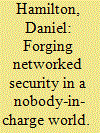

|
|
|
|
|
| Publication |
2010.
|
| Summary/Abstract |
There is much discussion of a 'multipolar' world in which great power consortia will manage global affairs. Reality will be different. The evolving international order is less likely to be shaped by great power condominium than driven by in-between peoples and spaces in a nobody-in-charge world. In an era of more fluid alignments, secondary states and non-state actors are setting their own agendas, even as the nature of many regional and global challenges has changed. State-centric approaches must give room to network-based solutions providing more effective interactions among a broader range of actors, including governments, the private sector and non-governmental organisations.
|
|
|
|
|
|
|
|
|
|
|
|
|
|
|
|
| 17 |
ID:
138342
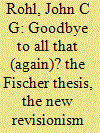

|
|
|
|
|
| Summary/Abstract |
What is the truth about the nature of the First World War and why have historians been unable to agree on its origins? The interpretation that no one country was to blame prevailed until the 1960s when a bitter international controversy, sparked by the work of the Hamburg historian Fritz Fischer, arrived at the consensus that the Great War had been a ‘bid for world power’ by imperial Germany and therefore a conflict in which Britain had necessarily and justly engaged. But in this centennial year Fischer's conclusions have in turn been challenged by historians claiming that Europe's leaders all ‘sleepwalked’ into the catastrophe. This article, the text of the Martin Wight Memorial Lecture held at the University of Sussex in November 2014, explores the archival discoveries which underpinned the Fischer thesis of the 1960s and subsequent research, and asks with what justification such evidence is now being set aside by the new revisionism.
|
|
|
|
|
|
|
|
|
|
|
|
|
|
|
|
| 18 |
ID:
131845
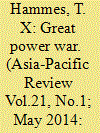

|
|
|
|
|
| Publication |
2014.
|
| Summary/Abstract |
Proponents of a wide range of power transition theories suggest that conflict between the United States and China is inevitable. History indicates that is not true and conflict can be deterred. A key element to that deterrence is an effective Alliance strategy. While the Obama Administration has outlined an effective deterrent national strategy, it has not provided any military strategy. Some have proposed Air Sea Battle can be that strategy. For a variety of reasons, ASB will not work. This article proposes the Alliance adopt Offshore Control as a military strategy to deter China and assure allies and friends in the region. It is based on the concept of defending the first island chain, denying China use of the seas inside the first island chain and dominating the seas outside it. Its deterrent power is enhanced because Offshore Control is affordable, politically feasible, and can be executed today.
|
|
|
|
|
|
|
|
|
|
|
|
|
|
|
|
| 19 |
ID:
146214
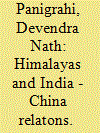

|
|
|
|
|
| Edition |
South Asian ed.
|
| Publication |
London, Routledge, 2016.
|
| Description |
xiii, 159p.hbk
|
| Series |
Nepal and Himalayan Studies; 3
|
| Standard Number |
9781138219519
|
|
|
|
|
|
|
|
|
|
|
|
Copies: C:1/I:0,R:0,Q:0
Circulation
| Accession# | Call# | Current Location | Status | Policy | Location |
| 058734 | 327.54051/PAN 058734 | Main | On Shelf | General | |
|
|
|
|
| 20 |
ID:
146474
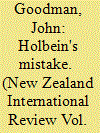

|
|
|
|
|
|
|
|